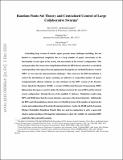Random Finite Set Theory and Centralized Control of Large Collaborative Swarms
Author(s)
Doerr, Bryce; Linares, Richard; Zhu, Pingping; Ferrari, Silvia
DownloadAccepted version (3.725Mb)
Open Access Policy
Open Access Policy
Creative Commons Attribution-Noncommercial-Share Alike
Terms of use
Metadata
Show full item recordAbstract
Controlling large swarms of robotic agents presents many challenges, including, but not limited to, computational complexity due to a large number of agents, uncertainty in the functionality of each agent in the swarm, and uncertainty in the swarm’s configuration. This work generalizes the swarm state using random finite set (RFS) theory and solves a centralized control problem with a quasi-Newton optimization through the use of model predictive control (MPC) to overcome the aforementioned challenges. This work uses the RFS formulation to control the distribution of agents assuming an unknown or unspecified number of agents. Computationally efficient solutions are also obtained via theMPCversion of the iterative linear quadratic regulator (ILQR), a variant of differential dynamic programming. Information divergence is used to define the distance between the swarm RFS and the desired swarm configuration through the use of the modified L distance. Simulation results using MPC and ILQR show that the swarm intensity converges to the desired intensity. Additionally, the RFS control formulation is shown to be very flexible in terms of the number of agents in the swarm and configuration of the desired Gaussian mixtures. Lastly, the ILQR and the Gaussian mixture probability hypothesis density filter are used in conjunction to solve a spacecraft relative motion problem with imperfect information to show the viability of centralized RFS control for this realworld scenario. 2 2
Date issued
2021Department
Massachusetts Institute of Technology. Department of Aeronautics and AstronauticsJournal
Journal of Guidance Control and Dynamics
Publisher
American Institute of Aeronautics and Astronautics (AIAA)